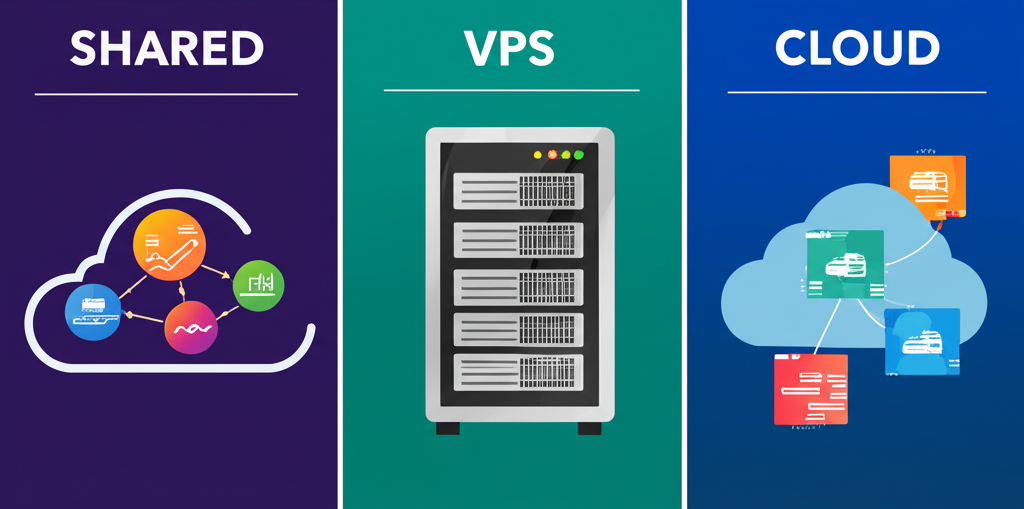- Web Hosting: Decoding Shared Hosting
- Advantages of Shared Hosting:
- Disadvantages of Shared Hosting:
- Web Hosting: Exploring VPS Hosting
- Advantages of VPS Hosting:
- Disadvantages of VPS Hosting:
- Web Hosting: Understanding Cloud Hosting
- Advantages of Cloud Hosting:
- Disadvantages of Cloud Hosting:
- Web Hosting: Which Type is Right for You?
- Web Hosting: Key Considerations Before Choosing
Web Hosting: Choosing Between Shared, VPS, and Cloud
Web hosting is the foundation of every website’s online presence. Choosing the right type of hosting – shared, VPS, or cloud – is crucial for performance, security, and scalability. Each option caters to different needs and budgets. Understanding the nuances of each type will empower you to make an informed decision that aligns perfectly with your website’s requirements.
Web Hosting: Decoding Shared Hosting

Shared hosting is the entry-level option, often the most affordable. It’s like sharing an apartment – you share server resources (CPU, RAM, storage) with other websites. This shared environment means a lower cost, but also potentially slower speeds if a neighboring site experiences a traffic surge.
Advantages of Shared Hosting:
Budget-friendly: Ideal for startups or small websites with limited budgets.
Ease of use: Typically comes with a user-friendly control panel, simplifying website management.
Low maintenance: The hosting provider handles server maintenance and updates.
Disadvantages of Shared Hosting:
Limited resources: Performance can be affected by other websites on the same server.
Security risks: A vulnerability on one site can potentially impact others on the shared server.
Less control: Limited customization options and access to server configurations.
Web Hosting: Exploring VPS Hosting
VPS hosting, or Virtual Private Server hosting, offers a middle ground between shared and dedicated hosting. Think of it as owning a condo in a building – you still share the physical server, but you have your own dedicated portion of resources, guaranteed not to be used by anyone else.
Advantages of VPS Hosting:
Enhanced performance: Dedicated resources ensure consistent website speed and uptime.
Improved security: Isolation from other users minimizes security risks.
Greater control: Root access allows for server customization and software installations.
Scalability: Easily upgrade resources as your website’s needs grow.
Disadvantages of VPS Hosting:
Higher cost: More expensive than shared hosting.
Requires technical expertise: Managing a VPS can be more complex than shared hosting and may require some server administration knowledge.
Web Hosting: Understanding Cloud Hosting
Cloud hosting leverages the power of multiple interconnected servers to host a website. This distributed network provides redundancy and scalability, ensuring your website remains accessible even if one server fails. Think of it as having multiple backup generators for your house – if one goes down, the others seamlessly take over.
Advantages of Cloud Hosting:
High availability and reliability: Redundancy ensures your website stays online, even during hardware failures.
Unmatched scalability: Easily scale resources up or down on demand to handle traffic fluctuations.
Cost-effective: Pay-as-you-go models allow you to only pay for the resources you consume.
Enhanced security: Distributed architecture offers better protection against attacks.
Disadvantages of Cloud Hosting:
Can be complex: Managing a cloud hosting environment requires technical expertise.
Cost can fluctuate: While scalable, unpredictable traffic spikes can lead to higher costs.
Vendor lock-in: Migrating from one cloud provider to another can be challenging.
Web Hosting: Which Type is Right for You?
Choosing the right web hosting depends on your specific needs and resources. Here’s a quick guide to help you decide:
Shared Hosting: Best for small websites, blogs, or personal portfolios with limited traffic and budgets.
VPS Hosting: Ideal for growing businesses, e-commerce websites, or projects requiring greater control and performance.
Cloud Hosting: Best for large websites, applications, or businesses needing high availability, scalability, and robust security.
Web Hosting: Key Considerations Before Choosing
Beyond the type of hosting, consider the below factors:
Uptime guarantee: Look for a provider that offers a high uptime guarantee (99.9% or higher).
Customer support: Reliable and accessible customer support is crucial for troubleshooting issues.
Backup and recovery: Ensure the hosting provider offers regular backups and disaster recovery options.
Bandwidth and storage: Choose a plan that provides adequate bandwidth and storage for your website’s needs.
* Security features: Prioritize providers with robust security measures, such as firewalls, malware scanning, and SSL certificates.
By carefully evaluating your needs and comparing hosting providers, you can choose the perfect web hosting solution that sets your website up for success. Remember, your web hosting is the foundation of your online presence – choose wisely.











Leave a Reply